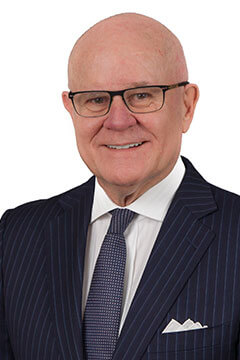
David Blackhall
UNPRECEDENTED upheavals in the Australian automotive industry, triggered by new regulations and inquiries and set against a background of disruptive trends in electrified and autonomous vehicles, has led the national dealer body to outline its roadmap of its five key policies and advocacies.
The Australian Automotive Dealer Association (AADA) said it was time to clear the air on current and future changes to the industry because it feared there was too much misinformation which has led to some sectors misconstruing the intent of the governments, the legislators and the automotive industry players.
In a comprehensive appraisal of the main issues facing the industry today, AADA CEO David Blackhall called these the “five pillars” of importance to the nation.
“We have set our sights on five key policies and advocacies,” he said.
They are, not necessarily in order, the desire for an industry code apart from the franchising code; the service and repair information debate; the Australian Consumer Law review; add-on insurance and the next step; and the taxation regime.
1. The automotive industry code:
Mr Blackhall said this was “a central plank in what we want to achieve in 2018”.
“We have made a very strong pitch to the government and the dealers to make a separate and very distinct automotive industry code to get us out from under the one-size-fits-all approach under the franchise code,” he said.
“We have been asked before why we want our own code and my simple answer is: The issue of scale. The Franchising Code of today applies to everything from a lawn-mowing business that is franchised with an investment of under $100,000, through to the same code governing the $40 million that some of our members have invested in high-street facilities for luxury brands.
“I have feedback from various OEMs and their managing directors that they don’t like this idea because they get this sense that we are out – somehow – through the creation of a code, to run their businesses for them.
“That is not what we are interested in. I am all in favour of the OEMs shaping their business the best way they can. That’s their job and their obligation – to fix the business in order to improve the outcome for consumers, for dealers, for everyone concerned.
“I am not interested in interfering. But we are not trying to run your business for you and we have no intention of doing that.
“We don’t have the information you do. We don’t know if a dealer is viable or not – that’s between you and the dealer.
“OEMs have a clear obligation to improve the economic and business outcomes for consumers and dealers and for their own businesses.
“If you’re not doing that, you’re not doing your job.
“But I say to the OEMs and their managers, when you do reshape your network, when you do alter your margins, when you do change your target-setting processes, when you do administer your warranties in certain ways, do it fairly.
“Do it transparently, do it with behaviours that are not unfair and unconscionable; do it using agreements and policies that bear the scrutiny of bright sunlight. Don’t try and hide behind some kind of global policy or process that says ‘Well it’s only Australia – this works in France or Germany or Korea or wherever – it must work in Australia’.
“Do it in a fair way for dealers. If you do that, we don’t have a problem. If you don’t, then we have a real issue.”

2. Mr Blackhall said the second pillar regarded the access of information on service and repair to independent businesses.
“This is part of the first pillar and comes out of the Australian Competition and Consumer Commission (ACCC) market study and shows that we all have to face reality and make it work,” he said.
“The ACCC now states that independent repairers should have good access to repair information and allow customers to have the choice about where they take their car to be serviced.
“How do you argue against that? In our submission, we pointed out to the ACCC that despite what has been said from the other side of the aisle, there isn’t a major brand in Australia that has words in its policy manual or owner’s manual that says you must bring your car back to the authorised dealer. There isn’t one.
“So the idea that franchised new-car dealers are trying to force owners to come to them is just not true. It has been used as an excuse by some independent workshops to attack the OEMs and say to consumers: ‘Look what the big multi-nationals are doing to the poor consumer. Taking away the freedom of choice!’
“It’s just not true and it’s time the hype went away. What is true is that we have, as franchised dealers, the highest level of expertise, the best equipment and the best facilities to keep your car in the condition that it is intended to be kept.
“The vast majority of customers get that and come back. In the three years or five years they come back – even though they can legally take the car down the road to an independent repairer for the warranty work.
“Very few people do that. Why? Because it just makes sense. You bought this car, you paid good money for it, and you want to keep it in good condition. Who is best person to keep the car running as it should? The dealer that sold it to you.
“The AADA really doesn’t have a big issue here. When Sean Buckley (executive chairman of Ultratune) says that Ultratune wants to be allowed to service new cars, I say ‘Knock yourself out!’
“Win the battle for the hearts and minds but you (the independent repairer such as Ultratune) won’t win it in the first three or five years. The numbers say that.
“Now, at the end of the warranty period, yes, people tend to say there’s no warranty so I may as well go to the guy at the end of the street.”
Mr Blackhall said that in the majority of cases, information codes are available from the OEM.
“Since the ACCC is going to enforce a widening of the data anyway, we might as well just get on and understand what the rules are going to be like.
“In the vast majority of cases, all the information is available. In some cases there are some sensitive codes that aren’t even available to the dealers.
“If a car turns up with a light on and the dealer needs a code so he can find out what it is and what’s gone wrong, quite often a call has to be made to the OEM to get that information.
“It’s not that every code is sitting there on the shelf – a lot are, but a lot aren’t. So if the ACCC is going to set up a regulation that says all the information must be available, we ask that they do a sensible thing and ‘ring-fence’ the security codes, the safety codes and the emission codes so that only people who have the required technical expertise and training and have the proper equipment can penetrate that ‘ring-fence’ and access the information.
“We have completed an independent study and clearly unless the cyber security around these codes is first-class, there is an immediate risk when the codes are passed into the hands of people who might be operating a digital environment who are less than first class.
“In an extreme case, the independent repairer may not have a secure computer system and he may be capable of being hacked. In an even worse scenario, he may even know people that he’s prepared to let hack him so that they can use the codes illegally and then you can quickly move into the grey area of criminal activity, car theft rings, bikie gangs, rebirthing … the whole thing gets murky when you lose control of that data.”

Mr Blackhall said the second point here was that fears of codes and data being misused for manufacturing parts – termed reverse engineering – was nonsense.
“Anyone wanting to make parts on the sly won’t need to access the codes and parts data – they just buy an original part and send it offshore to be copied cheaply.”
“We are not saying ‘no’ to anything regarding the way independent repairers are treated,” Mr Blackhall said.
“But we are saying ‘yes’ to some form of regulation. What we don’t have is any construct about how those codes will be protected and managed.
“The ACCC is silent on how this can happen. For example, if there is regulation then which body is responsible for controlling the data and how is this funded? Certainly the federal government isn’t about to fund it.
“The AADA has seen a model in the US that has an independent body to control the data and that’s probably something we can aim at in the future.
“The OEMs and FCAI have a different view on this, saying why should we just hand these codes over – and I get that,” he said.
“But I also get the reality of the ACCC who makes the rules has said to the government – regulate. And they will. So it’s time to get it sorted.
“Maybe, if it happens, dealers will open independent workshops and work on brands they don’t have as franchises. Maybe it’s a business opportunity.
“This has been the subject of debate for seven years. Do we not look a bit inept here, as an industry, should we not move on and get this done?
“One potential outcome will see this regulation wrapped up in an all-embracing industry code so that when we talk about the bad behaviours in some franchises that affect our dealers and our customers, then we can fix that at the same time we fix access to service and repair information.”

3. The third pillar is the Australian Consumer Law (ACL) review.
“This is a wide-ranging issue that will require a lot of work and may not be concluded this year, but I think a lot of progress would be made,” Mr Blackhall said.
“The review of the ACL that the relevant ministers in the states and federally have undertaken – is winding its way through the process.
“The commonwealth treasury will be launching a further round of consultation on this shortly.
“We don’t have a lot of concerns – it’s just a strengthening of the existing ACL. If you are operating your business correctly and ethically, you won’t be crossing any red lines.
“We believe this will be relatively straightforward but we’ll keep our eye on it when it comes more into focus in the latter part of the year.”

4. Add-on Insurance.
Mr Blackall said this matter was “close” to being resolved.
“The AADA is in regular contact with the Australian Securities and Investments Commission (ASIC) on this and it’s widely known that they favour a deferred-sale model – that is, a moratorium on the sale of add-on for a certain number of days after first consumer contact with the dealership.
“The message we get from ASIC is that they want to know that the right thing is being fixed. ASIC will probably go forward with a deferred sale model – and that may be a relatively short deferral period – but they are very interested in what materials, especially digital materials, are available to consumers.
“They want to see what information is available online or in video form to consumers to make an informed decision before buying that insurance.
“We have been told to soon expect a further consultation round on this matter and I get the impression ASIC is in no rush. They want to fix it once and so they are working through a lot of detail.
“Product disclosure statements are rarely read by customers, so ASIC wants to make the process easier. For dealers, it’s hard to disagree. We await with interest the ASIC proposals but we think the changes will be relatively healthy for the industry.
“We are not in love with a deferred sale, obviously, but we accept the fact that ASIC has been clear with us that it is one of the things that they will insist on, so we have to pull that into the realms of what’s practical and deliverable by dealers.”

5. Taxes
The last of the pillars revolves around the application of federal and state taxes to the industry and to the consumer.
“We need a broad policy objective on affordability issues for motor vehicles in Australia from the view of the consumer and the dealers,” Mr Blackhall said.
“This includes the luxury car tax (LCT), the legacy import duty (some from certain countries) and state duties and taxes that are regularly tweaked by state treasurers who have little interest in understanding the economics of the business we are in.
“We are planning to ramp up our state-based activities this year as we acquire more resources.
“We want to see if we can’t get a better understanding about why governments do what they do and help them perhaps understand that what they do is often a significant bad outcome for consumers – the very people they are trying to protect.
“We have asked repeatedly for renovation of the tax in the automotive industry but we don’t get a lot of attention here. That’s because the numbers are large.
“Total federal revenue is in the order of $1 billion annually and any loss has to be covered by treasury.”
Mr Blackhall said it will get worse for governments in the future as EVs have no fuel excise, car sharing lowers vehicle registration income and parking income, and so on.
He said, in talking to government officials and ministers, that the future may revolve around a user-pays system based on kilometres travelled.
“If that happens, we have a chance to completely renovate the tax structure as applied to motor vehicles,” he said.
“It’s early days and a lot of modelling has to occur. We want to keep the conversation with the government going on LCT and import duty, and with the state government on their taxes, but we think the future will involve a wholesale renovation of the tax and a more fairer regime.
“We don’t know how long in the future this will happen. But the removal of LCT won’t happen. If a minister stood up and said that his plan was to remove the LCT, no-one in the populace would care.
“We have record car sales each year. The prestige car-makers are a solid part of those record sales and everyone in government looks at this and says ‘why get rid of the income from LCT when the market is posting records?’.”
By Neil Dowling













 Read More: Related articles
Read More: Related articles

